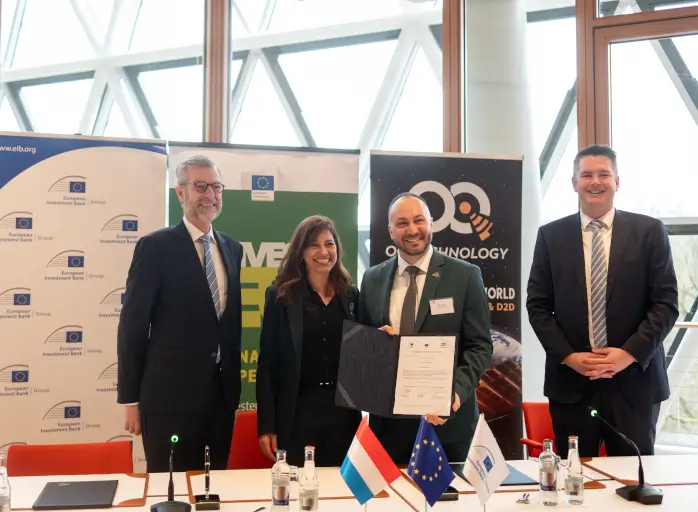

“We are not just machines. We are also people with emotions”
Solenne Niedercorn-Desouches, founder of fintech-focused media outlet, Finscale, explores the topic of diversity from the lens of the financial sector.
 Startup Luxembourg
Startup Luxembourg
Based on your 20+ years of experience in finance, why is women's empowerment a strategic imperative for Luxembourg's fintech growth?
Solenne Niedercorn-Desouches: Because it’s not a field where you find many women, naturally. Not just in Luxembourg, but I believe everywhere.
In a general sense, I think women need to be financially independent. For that to happen, you need people who can illustrate this and act as information vectors for women, so they can learn to manage their finances independently. In the tech and entrepreneurial environment, it's absolutely necessary to have women because otherwise, it remains extremely biased. We see that teams with both male and female founders are just as high-performing, if not more so, than teams with only male founders.
Generally speaking, diversity—not just gender, but diversity of profiles—brings a lot of good to society and to corporations. We cannot imagine a different world if we don't have more representation of that world in our leadership teams and among our entrepreneurs. Luxembourg remains a country heavily dominated by the finance industry, which is a very masculine industry. We don't value the feminine side enough. By the "feminine side," I mean that we all, as humans, have masculine and feminine polarities. We overvalue the masculine polarity, which is more about power, lucidity, courage, and strength, and undervalue the feminine side, which is more about intuition and the heart.
So, I think we need more female role models in finance and entrepreneurship to inspire other women, to make them think, "Yes, it's possible." They see other women who are succeeding and think, ‘She’s doing it, even with children.’ Men don't question themselves as much as women do, I think. That's just how our Western society works.
And just as we need more women in founding teams, we also need more women in the teams that invest in these startups. This means more female representation among venture capitalists and in private equity. If you look at the General Partners of private equity and VC funds in Europe, they are mostly men. Since we are all biased in our choices, if you have more women on investment teams, you will necessarily have more investment in female-led teams. It’s very positive that many investment funds are aware of this and are implementing quotas to ensure they have more female representation within the founding teams they invest in. This is a topic that venture capital and private equity have taken up in recent years, and I have high hopes that a good trend is taking hold.
The idea of “female role models” is very interesting because it comes up in almost every interview we've had...
Solenne Niedercorn-Desouches: For both men and women, by the way. But even more so for women, because women need examples like Christine Lagarde (President of the European Central Bank), Anne Boden or Rachel Delacour (two great female founders) and to see that it’s not an anomaly for a woman to be in charge. What I find most beautiful are the leaders who manage to reconcile their masculine and feminine sides—who embody both tenderness and listening, but also the alpha side of strength and power. These are truly two complementary polarities in us, as human beings.
What I find very unfortunate is how we put ourselves in boxes: the professional box, the personal box. We don’t mix them because you're not supposed to show emotions. It's as if, at work, we have to wear 15 masks to hide who we really are. Quite frankly, the most inspiring leaders are those who let who they are deep down show through, who talk about their weaknesses and uncertainties. That touches people, because we are not just machines. We are also people with emotions, and our emotions are there to help us, to guide us.
What are 2-3 key actions fintech companies in Luxembourg can take now to better empower women?
Solenne Niedercorn-Desouches: There are women in Fintech teams, the issue is more with the founding teams. In tech, it's complicated because you have many technological profiles, and in engineering schools, you have a male overrepresentation. So, if you want to recruit a CTO, the majority of profiles you'll find will be men. Women are harder to find, so it depends on the motivation of the entrepreneurs to go and find female tech profiles. It's possible, but it's more complicated.
Then, more generally, female students are still, for the most part, less attracted to pure finance jobs like mergers and acquisitions. So you start with more men than women in junior roles, and then the higher you go in seniority, the more it naturally weeds out the women.
This happens for multiple reasons, one of them remains, to my great dismay, becoming a mother. I had four pregnancies, and I had to make some pretty drastic choices. I took no maternity leave. This was about fifteen years ago, and at that time, if you took a long leave, you were penalised. So I decided I didn't want to lose years of career progression. That's why it's great to have paternity leave, so fathers can take days off to lighten the mother's load and show society that you don't have a child all by yourself.
There is a societal evolution that is heading in the right direction, but it doesn't happen overnight. In Luxembourg, unlike in France, there are no quotas for boards of directors and executive committees. So you tend to hire people who resemble you. It's a well-known cognitive bias. I sit on boards, and I am almost always the only woman. Necessarily, a group of men will have a different analytical prism than a mix of men and women.
What's your vision for Luxembourg's fintech sector, and what are the risks if it doesn't embrace female talent?
Solenne Niedercorn-Desouches: There's something I find extremely important in Luxembourg that isn't being done enough: supporting the finance workforce through the industry's transformation. We're talking about an industry evolving at high speed, with fundamental changes in user habits, market infrastructures, and jobs. People are not at all prepared for the wave that is coming.
If I think only about artificial intelligence, there are strategic choices to be made now that will have a definite impact on the workforce. My number one priority would be to prepare the industry, to support it so that it is on an equal footing with competitors. This means communicating at the level of management, boards, and regulators so that everyone works together. The CSSF is a rather innovative regulator, but there needs to be a general awareness that the transformation is happening right now. It's about training teams and preparing multi-year plans to help the industry stay up to date on Cyber Risk, AI, and transformation. We've already somewhat missed the boat on digitalsation, so we mustn't miss the boat on AI. I think there's a real challenge in transforming mindsets and workforces for the Grand Duchy.


